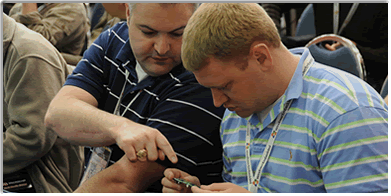
Will Technology Ever Be Able To Help Battle Addiction?
Addiction is a complicated psychological and physical disease, with many nuances and triggers that can be difficult to identify and properly treat to help a person overcome addiction. By definition, a person is addicted when they keep indulging themselves with a substance, like drugs and alcohol, or activity, like gambling, despite the fact that indulging has many negative effects on their life. With advancements in technology increasing, it has become apparent that many people have recently  become addicted to technology – however, being dependent on technology does not have the same effect as being addicted to gambling or substances like alcohol and drugs, because our communal addiction to technology stems from the fact that we have included technology in every area of life, and used it to improve upon all of our daily social interactions, as well as make certain activities easier, like transport, and more fun, like exercising and studying.
become addicted to technology – however, being dependent on technology does not have the same effect as being addicted to gambling or substances like alcohol and drugs, because our communal addiction to technology stems from the fact that we have included technology in every area of life, and used it to improve upon all of our daily social interactions, as well as make certain activities easier, like transport, and more fun, like exercising and studying.
It comes as no surprise that technology can be used to help battle addiction, and that this use will only increase in the future. There are many innovations, software and apps which can help a person during their recovery process in a tremendous way. Technology can be used when conducting research into psychological cues and triggers that cause addicts to relapse, as well as monitor a person’s online gambling tendencies and serve as an early indicator of pathological gambling. In these situations, technology can make a difference in a person’s life, especially if they have a problem with gambling, and highly contribute to making gambling safer.
Technology can also help people discover and experiment with new methods and meditation techniques which help reduce stress, as well as provide them with a virtual reality for further study and dealing with emotional and psychological issues.
Self-help and self-mentoring with technology
Today, among the numerous apps that we use, there are plenty of apps who are designed to send you positive messages and motivational words at certain points during the day. This is very helpful to people who suffer from addiction, because even if they have been to a rehabilitation center and gotten professional help, the battle doesn’t end there, but continues on. These types of apps can provide the addict with a personal sponsor, or a recovery mentor. In normal situations, the recovery mentor is a therapist form the rehab center the addicted person was checked into. After being released from the center, the recovering addict is sponsored, or monitored, by the therapist and is there to help them when they experience moments of crisis and possible relapse. However, today, there are millions of people addicted to various substances and activities, and often, the mentor or sponsor doesn’t have the time to focus on the patient properly and give them the correct type of help from afar. With the new apps, however, recovering addicts can be their own sponsors and mentors by getting the same type of personalized messages and support they need from the apps on their phones. An additional bonus from the apps is that while the recovering addict might feel self-conscious and opt not to seek help from their sponsor, there is no such awkwardness when using an app, which increases the chances of successful treatment and recovery.
Virtual reality systems help create personalized recovery programs
Virtual reality might seem like a futuristic luxury game, but advancements in realistic rendering have allowed some researchers to use it as a tool in discovering emotional, psychological, and visual cues and triggers that cause relapse in recovering addicts, without subjecting them to actual, real-life drugs, or alcohol. Researchers have thus been able to discover specifically what makes a person want to drink, or use the substance they’ve become addicted to, and create recovery programs, and adjustments to current recovery programs for other addicts who fall into the same category and are tempted by the same type of visual and emotional triggers. The success of the virtual reality experiments leads to the conclusion that in the future, many rehabilitation centers and therapists who treat addicts can use this technology to calibrate the way the patient is treated, and increase the chances of the addict’s successful reintegration in life, and help them overcome the addiction. During testing, the system can analyze everything, from the addict’s behavioral patterns, to the way their bodies react to the visual stimuli, allowing therapists and psychologists adjust not only the patient’s recovery program, but also the way they communicate with them, from posture to tone of voice, allowing them to find the perfect way to communicate with the patient to ensure their full recovery.
Rising the alarm for problem gamblers
In the days before online gambling, problem gamblers were spotted by bookies, betting stores and casino staff – people who are specifically trained to recognize and detect problem gamblers. Unlike popular opinion, problem gamblers are not casino’s most favorite customers, which is why the staff is trained not only to recognize them, but to also encourage the problem gamblers to seek help. On the other hand, online gambling means gambling anywhere – at home, or on the go, and it not only increased the number of problem gamblers since gaining popularity, it also made it impossible to detect a compulsive gambler until the gambler either broke down under the pressure of addiction, or was led to financial ruin.
Technology has come to the rescue and can help prevent this. Monitoring software, like BetBuddy can be installed on the suspected addict’s computer. The software will monitor everything about the problem gambler’s online gambling habits – how much money and time they spend on gambling, how often they gamble, and so on. This data is then compared to other data from other gamblers, and the software raises the alarm as soon as the gambler has shown signs of being addicted to online gambling. Together with website banning software, the problem gambler can heed the alarm and ask to be banned from gambling websites and online casinos, and thus, get help before gambling addiction has fully inserted its hooks into their lives.
Technology’s involvement in future addiction treatment
These possibilities are not ignored by the world’s experts, designers and innovators. The ways with which technology can help addiction treatment has often been the topic on the conferences and events held by Techinsightsevents.com. The company was originally founded in Silicon Valley, but today, they have spread around the world and have representatives in Brazil, Chicago, India as well as Boston, and their events are the place to be for people who are interested in technology, innovations and design. On these events, you can learn how technology has been used in the past to improve upon our lives, and discover the reasons why we have implemented it in every aspect and accepted it without compunction. Additionally, the keynote speakers on these events are experts in their respective fields, and much of the technology we use today has been discussed, designed and thoroughly planned on these events. This means that in the future, the involvement of technology in addiction treatment will only increase, and thus make it easier for recovering addicts to deal with their addiction, as well as provide them with the tools to do so in a comfortable and fun way.
ESC GLOBAL CONFERENCES
ESC Silicon Valley
May 2-5, 2011
McEnery Convention Center
San Jose, CA
ESC Brazil
May 24-25, 2011
Novotel Sao Paulo Center Norte
Sao Paulo, Brazil
ESC Chicago
June 6-8, 2011
Donald E. Stephens Convention Center
Chicago, IL
ESC India
July 20-22, 2011
NIMHANS Convention Center
Bangalore, India
ESC Boston
September 26-29, 2011
Hynes Convention Center
Boston, MA















